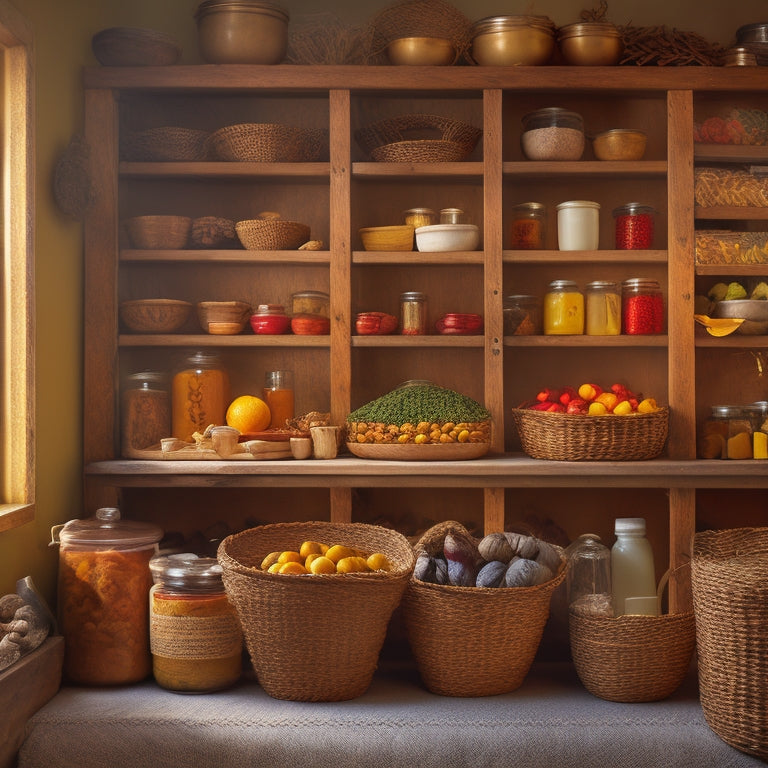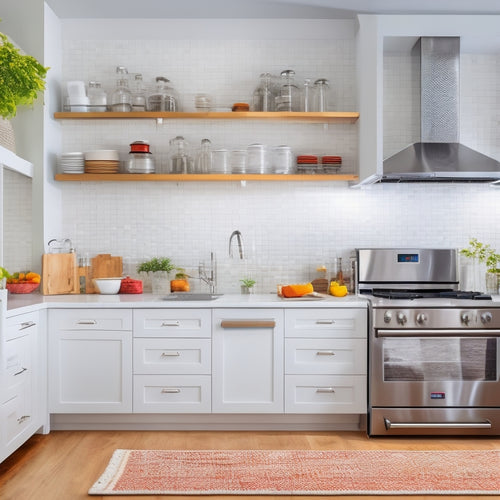
Master the Pantry: Key Ingredients for Success
Share
A well-organized pantry is essential for culinary success, providing a solid foundation for meal planning, preparation, and execution. Key elements include a categorized and labeled inventory, optimized shelf organization, and strategic meal planning strategies. A thoughtfully stocked pantry with versatile ingredients, global spices, and sustainable practices enables creativity and flexibility in the kitchen. By implementing these essentials, home cooks can streamline meal prep, reduce stress, and foster innovation. With a mastery of pantry principles, the possibilities for culinary exploration and expression become endless, and the journey to gastronomic excellence begins.
Key Takeaways
• A well-organized pantry with labeled containers and categorized items streamlines meal preparation and reduces stress.
• Meal planning strategies like recipe inspiration, budget-friendly meals, and shopping lists prevent overspending and food waste.
• Culinary creativity is boosted by ingredient substitutions, leftover transformations, and experimentation with unique flavor profiles.
• A stocked pantry with budget-friendly essentials, global spices, and versatile sauces enables diverse meal options and flavor elevation.
• Sustainable pantry practices like zero waste solutions, local sourcing, and composting promote environmental responsibility and social awareness.
Pantry Organization Essentials
Five key principles underlie a well-organized pantry, each essential for streamlining meal preparation and reducing culinary stress. An important aspect of pantry organization is container labeling, which enables quick identification of contents and prevents confusion. Clear labels also facilitate inventory management, ensuring that expired items are promptly removed.
Moreover, shelf organization is crucial for maximizing storage capacity and accessibility. Categorizing items by type and frequency of use optimizes storage, making it easier to locate ingredients when needed. By implementing these principles, home cooks can transform their pantry into a hub of efficiency, freeing up time and mental energy for more creative pursuits.
A well-organized pantry is the foundation upon which culinary success is built.
Meal Planning Strategies
With a well-organized pantry in place, attention can now shift to the critical task of meal planning, where strategic planning can greatly reduce meal prep stress and optimize kitchen efficiency.
Effective meal planning involves more than just deciding what to cook; it requires a thoughtful approach to recipe inspiration, budget-friendly meals, and culinary creativity. By implementing the following strategies, home cooks can take control of their kitchen and meal prep routine:
- Find recipe inspiration through cookbooks, food blogs, or social media to avoid meal prep monotony
- Plan budget-friendly meals around seasonal produce and pantry staples
- Create a shopping list based on planned recipes to prevent overspending
- Check pantry stock before shopping to avoid duplicate purchases
- Incorporate versatile ingredients to allow for diverse meal options
Culinary Creativity Boosters
Culinary innovation thrives when cooks venture beyond familiar recipes, embracing the freedom to experiment and improvise with ingredients and techniques. This creative liberty allows for the development of unique flavor profiles and dishes that showcase personal style.
One effective way to stimulate culinary creativity is through ingredient substitutions, where cooks swap out traditional ingredients for alternatives that add new dimensions to recipes. Another strategy is leftover transformations, where yesterday's dinner becomes tomorrow's lunch through clever repurposing.
Stocking Your Pantry
A well-stocked pantry serves as the foundation of a cook's creativity, providing the necessary building blocks for experimentation and innovation in the kitchen.
To build a pantry that sparks inspiration, consider the following essentials:
-
Budget friendly options: Stock up on affordable staples like rice, beans, and canned goods to create a foundation for meals.
-
International flavors: Incorporate global spices and seasonings to add depth and variety to dishes.
-
Oils and vinegars: Keep a selection of oils and vinegars on hand to elevate flavor profiles.
-
Versatile sauces and condiments: Stock up on sauces and condiments that can be used in a variety of dishes.
-
Dried herbs and spices: Include a range of dried herbs and spices to add flavor to simple dishes.
Sustainable Pantry Practices
By adopting sustainable pantry practices, home cooks can greatly reduce their environmental footprint while maintaining a well-stocked and organized kitchen. Implementing zero waste solutions, such as buying in bulk and using reusable containers, minimizes packaging waste to a large extent.
Opting for locally sourced products not only supports the community but also reduces carbon emissions from transportation. Composting benefits extend beyond the kitchen, as it converts food scraps into nutrient-rich soil and reduces landfill waste.
In addition, participating in food donation initiatives helps combat food insecurity in local communities. By incorporating these sustainable practices, home cooks can create a more environmentally conscious kitchen that not only benefits the planet but also promotes a sense of social responsibility.
Frequently Asked Questions
How Do I Maintain Motivation to Keep My Pantry Organized Long-Term?
To maintain long-term pantry organization motivation, implement motivational tips like regular decluttering sessions, and organizing hacks such as categorizing and labeling. Adopt sustainable solutions, like reusable containers, to foster a sense of accomplishment and control.
Can a Small Pantry Still Be Functional and Organized?
"Savvy spatial savers can still achieve serene storage in small pantries by employing space-saving solutions, such as vertical storage, creative labeling, and basket organization, maximizing every inch for a functional and organized space."
Are There Any Pantry Organization Systems Suitable for Renters?
Renters can employ temporary solutions like hanging storage and adhesive hooks to maximize vertical space, while portable organizers and stackable bins provide flexible and removable storage options, ensuring a functional pantry despite spatial limitations.
How Often Should I Deep Clean and Reorganize My Pantry?
'Like a well-conducted orchestra, a harmonious pantry requires regular fine-tuning. Aim to deep clean and reorganize your pantry every 2-3 months to maintain peak organization, reap benefits like reduced food waste, and guarantee a seamless cooking experience.'
Can I Still Have a Functional Pantry on a Limited Budget?
On a limited budget, a functional pantry is achievable through budget-friendly pantry hacks, such as repurposing containers, utilizing vertical space, and implementing creative storage solutions, ensuring ideal organization and accessibility without breaking the bank.
Related Posts
-

Optimize Your Kitchen Storage With 7 Simple Hacks
You're already wasting valuable kitchen space without realizing it, and it's likely due to a lack of strategic storag...
